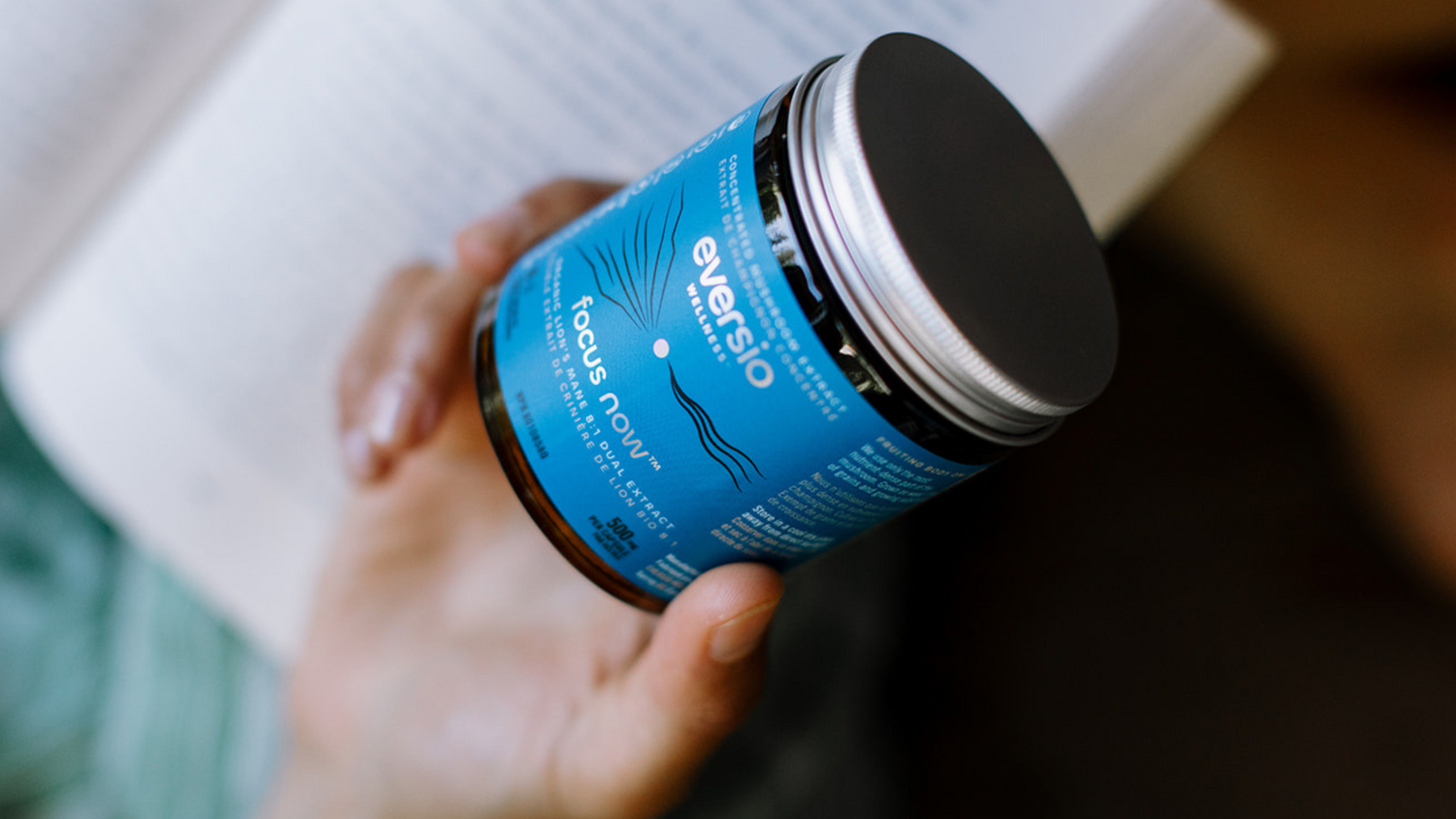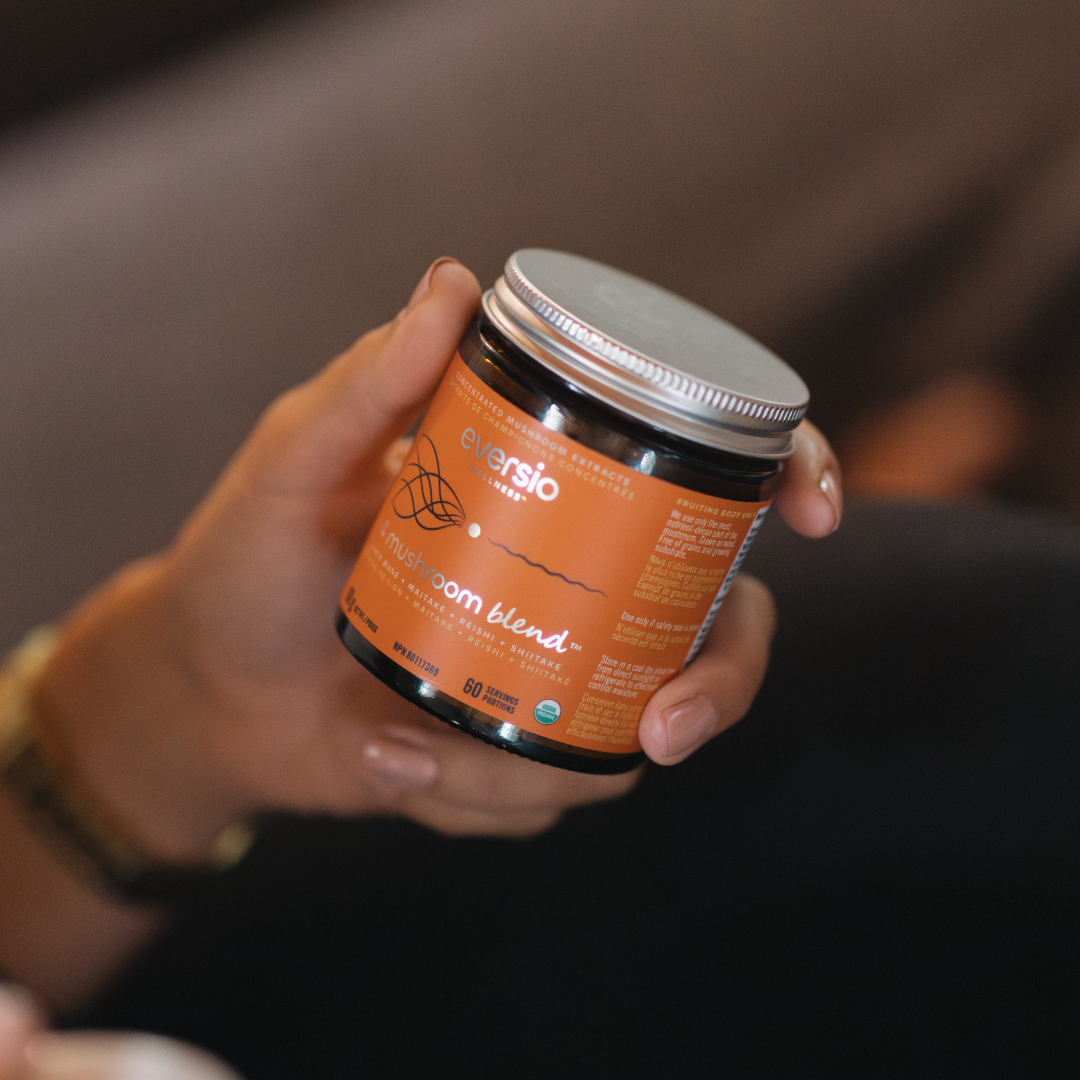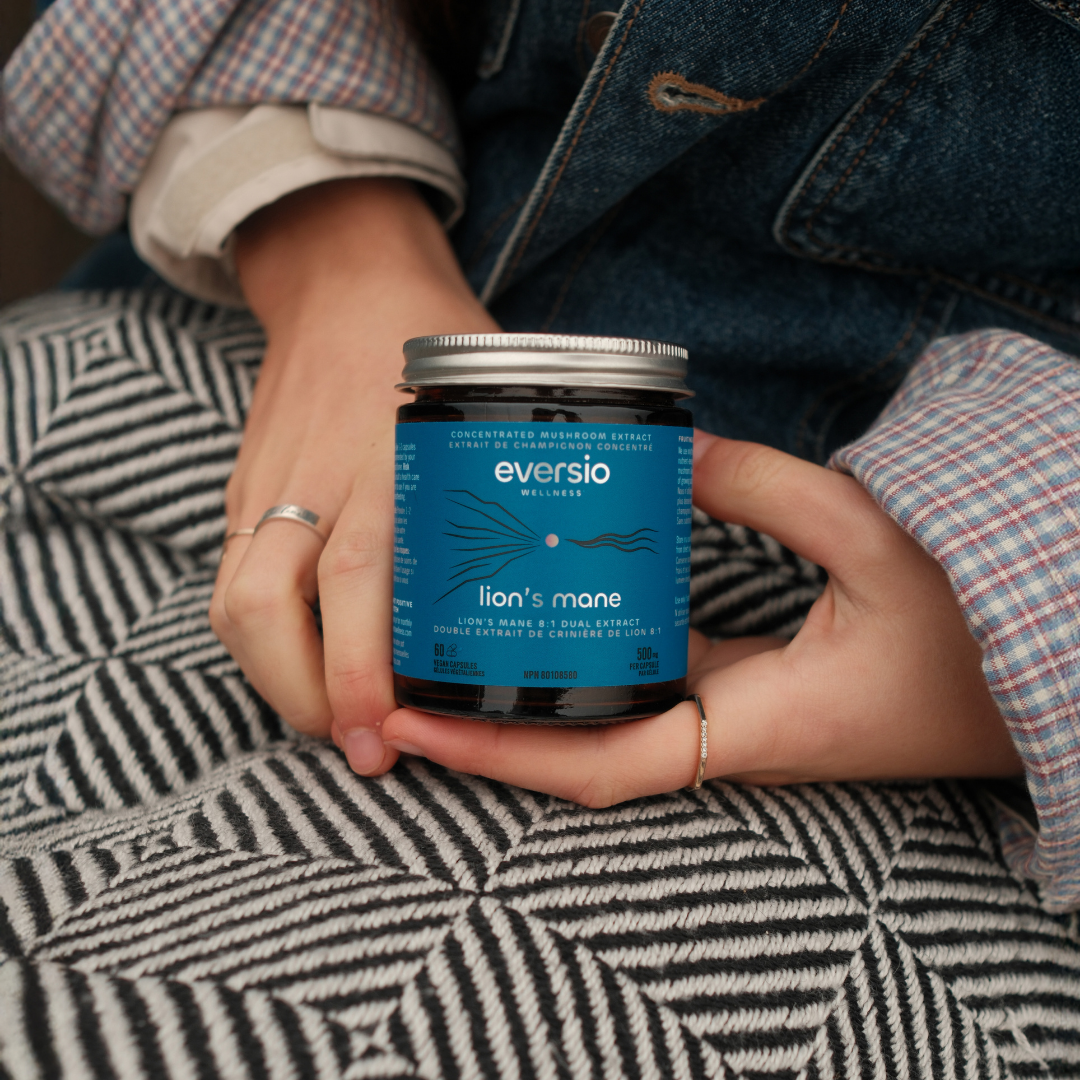Lion’s Mane, also known as Hericium erinaceus, is a beautiful, white, furry looking mushroom that has been used for ages in both the culinary and medical worlds around the globe. Lion's mane mushroom benefits are many and they can be cooked, dried and extracted for capsules, or even steeped as a tea. However, their versatility does not end there! Clinical studies show they have many potential benefits on our overall health; from mental health to cancer, there may be a spot for Lion’s Mane and it's high percentage of beta glucans in your daily routine.
Lion’s Mane as a Neurotrophic and Neuroprotective Agent
As we age, our brain health and brain’s ability to form or preserve neuronal connections naturally declines and we progressively experience worsening mental functioning. Lion’s Mane contains several active compounds, but two of those, hericenones and erinacines, have been found to stimulate the growth of brain cells [1]. A constituent, isohericerinol A, extracted from the fruiting bodies of Lion’s Mane, was found in a recent study to strongly increase nerve growth factor (NGF) production, which subsequently improved the outgrowth of neuronal projections and connections [2].
Lion’s Mane has also exhibited neuroprotective actions through its ability to prevent neuronal damage caused by beta-amyloid plaques; accumulations that build up in the brain in Alzheimer’s disease [3,4,5]. The beta-amyloid proteins are naturally occurring, but when they build up and form plaques, this results in disruption of proper cell functioning in the brain. For those with a family history of dementia who are interested in prevention, Lion’s Mane may be an appropriate addition to your efforts.
Lion’s Mane in Mood and Sleep Disorders
A study was done in 2019 that assessed whether Lion’s Mane mushroom supplements could improve depression, anxiety, common sleep disorders, and binge eating disorders in a group of overweight patients after 8 weeks of supplementation [6]. They assessed the serum balances of brain-derived neurotrophic factor (BDNF) and its precursor pro-BDNF before and after supplementation of Lion’s Mane. The study found that, after 8 weeks, the patient’s presented with increased serum levels of pro-BDNF, and improvements in their depression, anxiety, and sleep quality [6].
The mechanisms of action of BDNF are far from simple, but it has been found that decreased BDNF or a dysfunction in its processes can cause decreased excitatory neurons and glutamate, which may potentially lead to depression [7]. BDNF also assists in prolonging the survival of existing neurons and promoting the growth of new ones [7]. Usually, a lion's mane product is not intended as a sleep aid, however, it is often seen that people with sleep problems or chronic insomnia can improve their ability to stay asleep when including it.
With a large proportion of our population living with daily symptoms of anxiety and depression, research into alternative methods is continuously diving deeper. Lion’s Mane has been found to be effective in reducing mild signs and symptoms of anxiety through its anti-inflammatory and neurotrophic actions. The hippocampus is a region of the brain responsible for emotion and memory. Countless studies have found that in mood disorders, such as depression, this region is less than average in size, meaning there is a shrinkage of brain circuits in the area, affecting its functioning.
A study published in 2018 found that the actions of Lion’s Mane in exerting anxiolytic and anti-depressant effects may lie in its ability to enhance neurogenesis in the hippocampus [8]. How powerful is this mushroom that it may hold an ability to promote formation of new neurons in the brain!

Lion’s Mane may Also Have Anti-Cancer Properties
The development of cancer in our bodies lies in a process in which DNA may become damaged and result in unregulated division and replication of cells. Polysaccharides are a large component of Lion’s Mane and have been researched to hold anti-cancer properties. One specific polysaccharide, HEG-5, was studied and found to inhibit proliferation and formation of human gastric cancer cells by promoting programmed cell death and cell cycle arrest, which would assist in preventing the uncontrollable replication of cells that results in cancer [9].
Another study found that an extract of the fruiting body of Lion’s Mane delivered as lion's mane capsules was also able to induce programmed cell death, but this time, it was found in human leukemia cells [10]. With this knowledge, the potential for adding Lion’s Mane as an adjunct to your cancer treatment or prevention plan may be beneficial to cancers across the board as it strengthens the immune system.
Lion’s Mane may Improve Healing Time of Nerve Injuries
When we think of nerve injuries, the most common supplement to come to mind is vitamin B12. It has long been deemed as a vital component in the treatment of peripheral nerve disorders or injuries. However, one study compared the efficacy of B12 to an extract of Lion’s Mane in their abilities to heal peripheral nerve injuries [11]. This study found that the group treated with Lion’s Mane exhibited signs of normal functioning earlier than the negative control group [11]. Its ability to assist in healing was due to its role in increasing the speed of the cascade of events that lead to nerve regeneration [11]. However, this research only exists in animal studies and evidence in humans is still lacking.

Lion’s Mane’s Role in H. Pylori infections, Ulcer Prevention and IBD Treatment
In today’s day and age of constant hustling and bustling, we’re eating on-the-run and letting stress overtake much of our lives. Not only this, but we can easily reach 5 cups of coffee a day and there’s nothing like a glass of wine to end our nights. However, all of these things leave us prone to inflammation, which leaves us prone to developing chronic or acute illnesses, some of those being gastric ulcers and inflammatory bowel disease (IBD).
Lion’s Mane has been found to contain constituents which are inhibitory to H. pylori development, which is one of the most common causes of gastric ulcers [12]. Its inhibitory action, in addition to its immunomodulating and anti-inflammatory properties, give rise to the potential of including Lion’s Mane into the treatment of H. pylori-associated gastrointestinal disorders. Additionally, one study found that Lion’s Mane was superior to acid-lowering drugs at preventing alcohol-induced stomach ulcers, with zero negative side effects [13]. However, the exact mechanism of action is still unknown.
Medicinal mushrooms are all highly regarded as having many anti-inflammatory properties and Lion’s Mane is one of these. With consideration that most disease is a result of inflammation, mushrooms can play a role in a countless number of medical conditions. However, Lion’s Mane’s anti-inflammatory property was not the only aspect of the mushroom to assist in the treatment of inflammatory bowel disease; it illustrated actions of immunomodulation and regulation of gut microbiota, which targeted multiple aspects of the disease picture as a whole [14,15,16].
By now, you’ve probably been able to recognize the versatility of this unique and friendly fungi. In addition to the benefits already covered, research continues to shed light on even more ways in which Lion’s Mane may prove beneficial; such as reducing cardiovascular disease risk and managing diabetes. However, it is important to note that the mechanisms of action of Lion’s Mane root in its ability to reduce inflammation and oxidative stress; key factors in the development of disease. As winter approaches and we struggle to stay warm, why not give Lion’s Mane a try by adding it to your coffee or hot cocoa!
By Silvana Jakupovic — BSc and 4th Year Student of Naturopathic Medicine (CCNM-Boucher)
References:
[1] Lai PL, Naidu M, Sabaratnam V, Wong KH, David RP, Kuppusamy UR, Abdullah N, Malek SN. Neurotrophic properties of the Lion's mane medicinal mushroom, Hericium erinaceus (Higher Basidiomycetes) from Malaysia. Int J Med Mushrooms. 2013;15(6):539-54. doi: 10.1615/intjmedmushr.v15.i6.30. PMID: 24266378.
[2] Ryu SH, Hong SM, Khan Z, Lee SK, Vishwanath M, Turk A, Yeon SW, Jo YH, Lee DH, Lee JK, Hwang BY, Jung JK, Kim SY, Lee MK. Neurotrophic isoindolinones from the fruiting bodies of Hericium erinaceus. Bioorg Med Chem Lett. 2021 Jan 1;31:127714. doi: 10.1016/j.bmcl.2020.127714. Epub 2020 Nov 25. PMID: 33246107.
[3] Tsai-Teng T, Chin-Chu C, Li-Ya L, Wan-Ping C, Chung-Kuang L, Chien-Chang S, Chi-Ying HF, Chien-Chih C, Shiao YJ. Erinacine A-enriched Hericium erinaceus mycelium ameliorates Alzheimer's disease-related pathologies in APPswe/PS1dE9 transgenic mice. J Biomed Sci. 2016 Jun 27;23(1):49. doi: 10.1186/s12929-016-0266-z. PMID: 27350344; PMCID: PMC4924315.
[4] Zhang J, An S, Hu W, Teng M, Wang X, Qu Y, Liu Y, Yuan Y, Wang D. The Neuroprotective Properties of Hericium erinaceus in Glutamate-Damaged Differentiated PC12 Cells and an Alzheimer's Disease Mouse Model. Int J Mol Sci. 2016 Nov 1;17(11):1810. doi: 10.3390/ijms17111810. PMID: 27809277; PMCID: PMC5133811.
[5] Cheng JH, Tsai CL, Lien YY, Lee MS, Sheu SC. High molecular weight of polysaccharides from Hericium erinaceus against amyloid beta-induced neurotoxicity. BMC Complement Altern Med. 2016 Jun 7;16:170. doi: 10.1186/s12906-016-1154-5. PMID: 27266872; PMCID: PMC4895996.
[6] Vigna L, Morelli F, Agnelli GM, Napolitano F, Ratto D, Occhinegro A, Di Iorio C, Savino E, Girometta C, Brandalise F, Rossi P. Hericium erinaceus Improves Mood and Sleep Disorders in Patients Affected by Overweight or Obesity: Could Circulating Pro-BDNF and BDNF Be Potential Biomarkers? Evid Based Complement Alternat Med. 2019 Apr 18;2019:7861297. doi: 10.1155/2019/7861297. PMID: 31118969; PMCID: PMC6500611.
[7] Yang, T., Nie, Z., Shu, H., Kuang, Y., Chen, X., Cheng, J., Yu, S., & Liu, H. (2020). The role of BDNF on neural plasticity in Depression. Frontiers in Cellular Neuroscience, 14. https://doi.org/10.3389/fncel.2020.00082
[8] Ryu S, Kim HG, Kim JY, Kim SY, Cho KO. Hericium erinaceus Extract Reduces Anxiety and Depressive Behaviors by Promoting Hippocampal Neurogenesis in the Adult Mouse Brain. J Med Food. 2018 Feb;21(2):174-180. doi: 10.1089/jmf.2017.4006. Epub 2017 Nov 1. PMID: 29091526.
[9] Zan X, Cui F, Li Y, Yang Y, Wu D, Sun W, Ping L. Hericium erinaceus polysaccharide-protein HEG-5 inhibits SGC-7901 cell growth via cell cycle arrest and apoptosis. Int J Biol Macromol. 2015 May;76:242-53. doi: 10.1016/j.ijbiomac.2015.01.060. Epub 2015 Feb 20. PMID: 25703932.
[10] Kim SP, Kang MY, Choi YH, Kim JH, Nam SH, Friedman M. Mechanism of Hericium erinaceus (Yamabushitake) mushroom-induced apoptosis of U937 human monocytic leukemia cells. Food Funct. 2011 Jun;2(6):348-56. doi: 10.1039/c1fo10030k. Epub 2011 Jun 8. PMID: 21779573.
[11] Wong KH, Naidu M, David RP, Bakar R, Sabaratnam V. Neuroregenerative potential of lion's mane mushroom, Hericium erinaceus (Bull.: Fr.) Pers. (higher Basidiomycetes), in the treatment of peripheral nerve injury (review). Int J Med Mushrooms. 2012;14(5):427-46. doi: 10.1615/intjmedmushr.v14.i5.10. PMID: 23510212.
[12] Shang X, Tan Q, Liu R, Yu K, Li P, Zhao GP. In vitro anti-Helicobacter pylori effects of medicinal mushroom extracts, with special emphasis on the Lion's Mane mushroom, Hericium erinaceus (higher Basidiomycetes). Int J Med Mushrooms. 2013;15(2):165-74. doi: 10.1615/intjmedmushr.v15.i2.50. PMID: 23557368.
[13] Wong JY, Abdulla MA, Raman J, Phan CW, Kuppusamy UR, Golbabapour S, Sabaratnam V. Gastroprotective Effects of Lion's Mane Mushroom Hericium erinaceus (Bull.:Fr.) Pers. (Aphyllophoromycetideae) Extract against Ethanol-Induced Ulcer in Rats. Evid Based Complement Alternat Med. 2013;2013:492976. doi: 10.1155/2013/492976. Epub 2013 Nov 5. PMID: 24302966; PMCID: PMC3835629.
[14] Qin M, Geng Y, Lu Z, Xu H, Shi JS, Xu X, Xu ZH. Anti-Inflammatory Effects of Ethanol Extract of Lion's Mane Medicinal Mushroom, Hericium erinaceus (Agaricomycetes), in Mice with Ulcerative Colitis. Int J Med Mushrooms. 2016;18(3):227-34. doi: 10.1615/IntJMedMushrooms.v18.i3.50. PMID: 27481156.
[15] Diling C, Xin Y, Chaoqun Z, Jian Y, Xiaocui T, Jun C, Ou S, Yizhen X. Extracts from Hericium erinaceus relieve inflammatory bowel disease by regulating immunity and gut microbiota. Oncotarget. 2017 Sep 6;8(49):85838-85857. doi: 10.18632/oncotarget.20689. PMID: 29156761; PMCID: PMC5689651.
[16] Ren Y, Geng Y, Du Y, Li W, Lu ZM, Xu HY, Xu GH, Shi JS, Xu ZH. Polysaccharide of Hericium erinaceus attenuates colitis in C57BL/6 mice via regulation of oxidative stress, inflammation-related signaling pathways and modulating the composition of the gut microbiota. J Nutr Biochem. 2018 Jul;57:67-76. doi: 10.1016/j.jnutbio.2018.03.005. Epub 2018 Mar 16. PMID: 29677563.




















Leave a comment
All comments are moderated before being published.
This site is protected by hCaptcha and the hCaptcha Privacy Policy and Terms of Service apply.